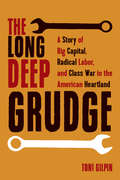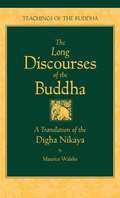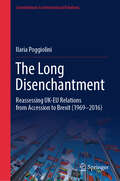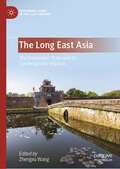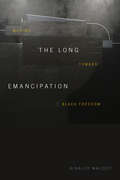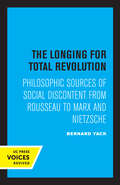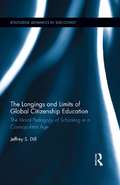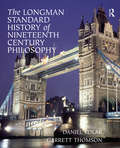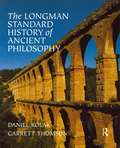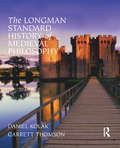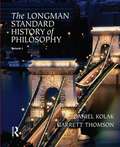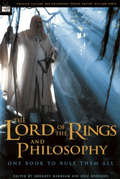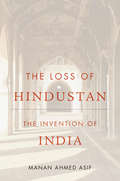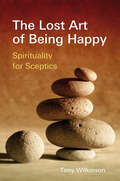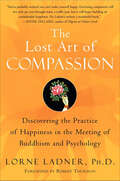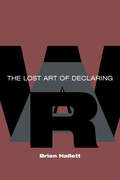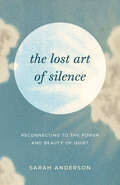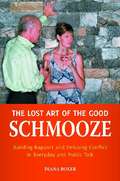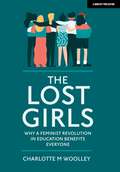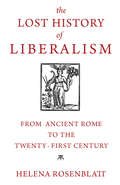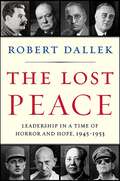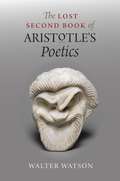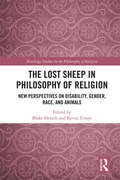- Table View
- List View
The Long Deep Grudge: A Story of Big Capital, Radical Labor, and Class War in the American Heartland
by Toni Gilpin&“The definitive history of an important but largely forgotten labor organization and its heroic struggles with an icon of industrial capitalism.&” —Ahmed A. White, author of The Last Great Strike This rich history details the bitter, deep-rooted conflict between industrial behemoth International Harvester and the uniquely radical Farm Equipment Workers union. The Long Deep Grudge makes clear that class warfare has been, and remains, integral to the American experience, providing up-close-and-personal and long-view perspectives from both sides of the battle lines. International Harvester—and the McCormick family that largely controlled it—garnered a reputation for bare-knuckled union-busting in the 1880s, but in the twentieth century also pioneered sophisticated union-avoidance techniques that have since become standard corporate practice. On the other side the militant Farm Equipment Workers union, connected to the Communist Party, mounted a vociferous challenge to the cooperative ethos that came to define the American labor movement after World War II. This evocative account, stretching back to the nineteenth century and carried through to the present, reads like a novel. Biographical sketches of McCormick family members, union officials and rank-and-file workers are woven into the narrative, along with anarchists, jazz musicians, Wall Street financiers, civil rights crusaders, and mob lawyers. It touches on pivotal moments and movements as wide-ranging as the Haymarket &“riot,&” the Flint sit-down strikes, the Memorial Day Massacre, the McCarthy-era anti-communist purges, and America&’s late twentieth-century industrial decline. &“A capitalist family dynasty, a radical union, and a revolution in how and where work gets done—Toni Gilpin&’s The Long Deep Grudge is a detailed chronicle of one of the most active battlefronts in our ever-evolving class war.&” —John Sayles
The Long Discourses of the Buddha: A Translation of the Digha Nikaya (The Teachings of the Buddha)
by Ajahn Sumedho Maurice WalsheThis book offers a complete translation of the Digha Nikaya, the long discourses of the Buddha, one of the major collections of texts in the Pali Canon, the authorized scriptures of Theravada Buddhism. This collection--among the oldest records of the historical Buddha's original teachings, given in India two and a half thousand years ago--consists of thirty-four longer-length suttas, or discourses, distinguished as such from the middle-length and shorter suttas of the other collections. These suttas reveal the gentleness, compassion, power, and penetrating wisdom of the Buddha. Included are teachings on mindfulness (Mahasatipatthana Sutta); on morality, concentration, and wisdom (Subha Sutta); on dependent origination (Mahanidrana Sutta); on the roots and causes of wrong views (Brahmajala Sutta); and a long description of the Buddha's last days and passing away (Mahaparinibbana Sutta); along with a wealth of practical advice and insight for all those travelling along the spiritual path. Venerable Sumedho Thera writes in his foreword: "[These suttas] are not meant to be 'sacred scriptures' that tell us what to believe. One should read them, listen to them, think about them, contemplate them, and investigate the present reality, the present experience, with them. Then, and only then, can one insightfully know the truth beyond words." Introduced with a vivid account of the Buddha's life and times and a short survey of his teachings, The Long Discourses of the Buddha brings us closer in every way to the wise and compassionate presence of Gotama Buddha and his path of truth.
The Long Disenchantment: Reassessing UK-EU Relations from Accession to Brexit (1969–2016) (Contributions to International Relations)
by Ilaria PoggioliniThis book seeks to replace a comforting European narrative of British missed opportunities with a chronicle of the complexity of UK/EC-EU relations. After nearly a decade of Brexit (2016), it revisits the historical evolution of the relationship between Britain and Europe since the 1970s. Building on an in-depth study of primary and secondary sources, the author sheds new light on the intricacies of that relationship. The book is structured in six chapters, the first of which reflects on the causes of the UK's lack of engagement in the early and crucial developments of the European Community. The second chapter revisits ten years of stop-go diplomacy of accession, and the meaning of the first enlargement for Britain and its partners. The third chapter argues that in the early years, entry represented for Britain an opportunity to deliver change, working with France and Germany inside the EC; and, as an EC member, building new relationships with countries outside, including in the Commonwealth. The fourth chapter focuses on the dawning realisation that EC membership meant for Britain joining its partners on a journey towards an unknown destination in search of whatever-closer Union would mean. The Fifth chapter concentrates on the 1980s, when, on the one hand, the British government was to the fore in the creation of a single market; while on the other it openly challenged an agreed-upon narrative, among the continental member states. This narrative was one which sought to reshape European values and relationships, together with its culture, geography and history, round a commitment to greater integration. The final chapter is an epilogue that examines the political decisions of the last four British prime ministers: Major, Brown, Blair and Cameron, in confronting and reacting to the reality of European Union, from the Maastricht Treaty (1992) onward. This examination suggests that, rather than political continuity, discontinuity, led the UK, through Prime Minister David Cameron's efforts at renegotiation in the EU, to Brexit, and his instant resignation. This book invites readers to rethink, refine, and challenge the dominant narrative of Britain as a predictable, permanent outsider condemned to irrelevance in the EC/EU. It will appeal to scholars of international relations and political history, as well as political decision-makers, both in Britain and the EU.
The Long East Asia: The Premodern State and Its Contemporary Impacts (Governing China in the 21st Century)
by Zhengxu WangThis book brings together a range of studies that aim at illustrating the ideas, institutions, historical patterns, and contemporary relevance of the social-political system that existed in the main part of East Asia during the premodern era. This is most often known as the Confucian literati-bureaucratic state, the imperial Chinese bureaucratic state, or the Confucian-Legalist state, that was established and endured most notably in China, but also in several East Asian societies such as Korea, Vietnam, Japan. That state and sociopolitical system also greatly shaped state making in several kingdoms in the region – such as Ryukyu and Dali – which were later merged into larger polities. Illuminating the significance of these historical patterns for today, this book will interest political scientists, historians, philosophers, and the general public.
The Long Emancipation: Moving toward Black Freedom
by Rinaldo WalcottIn The Long Emancipation Rinaldo Walcott posits that Black people globally live in the time of emancipation and that emancipation is definitely not freedom. Taking examples from across the globe, he argues that wherever Black people have been emancipated from slavery and colonization, a potential freedom has been thwarted. Walcott names this condition the long emancipation—the ongoing interdiction of potential Black freedom and the continuation of the juridical and legislative status of Black nonbeing. Stating that Black people have yet to experience freedom, Walcott shows that being Black in the world is to exist in the time of emancipation in which Black people must constantly fashion alternate conceptions of freedom and reality through expressive culture. Given that Black unfreedom lies at the center of the making of the modern world, the attainment of freedom for Black people, Walcott contends, will transform the human experience worldwide. With The Long Emancipation, Walcott offers a new humanism that begins by acknowledging that present conceptions of what it means to be human do not currently include Black people.
The Longing for Total Revolution: Philosophic Sources of Social Discontent from Rousseau to Marx and Nietzsche
by Bernard YackBernard Yack seeks to identify and account for the development of a form of discontent held in common by a large number of European philosophers and social critics, including Rousseau, Schiller, the young Hegel, Marx, and Nietzsche. Yack contends that these individuals, despite their profound disagreements, shared new perspectives on human freedom and history, and that these perspectives gave their discontent its peculiar breadth and intensity. This title is part of UC Press's Voices Revived program, which commemorates University of California Press’s mission to seek out and cultivate the brightest minds and give them voice, reach, and impact. Drawing on a backlist dating to 1893, Voices Revived makes high-quality, peer-reviewed scholarship accessible once again using print-on-demand technology. This title was originally published in 1992.
The Longings and Limits of Global Citizenship Education: The Moral Pedagogy of Schooling in a Cosmopolitan Age (Routledge Advances in Sociology #109)
by Jeffrey S. DillAs the world seemingly gets smaller and smaller, schools around the globe are focusing their attention on expanding the consciousness and competencies of their students to prepare them for the conditions of globalization. Global citizenship education is rapidly growing in popularity because it captures the longings of so many—to help make a world of prosperity, universal benevolence, and human rights in the midst of globalization’s varied processes of change. This book offers an empirical account from the perspective of teachers and classrooms, based on a qualitative study of ten secondary schools in the United States and Asia that explicitly focus on making global citizens. Global citizenship in these schools has two main elements, both global competencies (economic skills) and global consciousness (ethical orientations) that proponents hope will bring global prosperity and peace. However, many of the moral assumptions of global citizenship education are more complex and contradict these goals, and are just as likely to have the unintended consequence of reinforcing a more particular Western individualism. While not arguing against global citizenship education per se, the book argues that in its current forms it has significant limits that proponents have not yet acknowledged, which may very well undermine it in the long run.
The Longman Standard History of 19th Century Philosophy
by Daniel Kolak Garrett ThomsonWith selections of philosophers from Fichte to Dewey, this new anthology provides significant learning support and historical context for the readings along with a wide variety of pedagogical assists.Biographical headnotes, reading introductions, study questions, and specialPrologues andPhilosophical Overviews help students understand and appreciate the philosophical concepts under discussion.Philosophical Bridges discuss how the work of earlier thinkers would influence philosophers to come, and place major movements in a contemporary context, showing students how the schools of philosophy interrelate and how various philosophies apply to the world today.In addition to this volume of 19th Century Philosophy, a comprehensive survey of the whole of Western philosophical history, and other individual volumes for each of the major historical eras are also available for specialized courses.
The Longman Standard History of Ancient Philosophy
by Daniel Kolak Garrett ThomsonWith selections of philosophers from Thales to Sextus Empiricus, this new anthology provides significant learning support and historical context for the readings along with a wide variety of pedagogical assists. Biographical headnotes, reading introductions, study questions, and special “Prologues” and “Philosophical Overviews” help students understand and appreciate the philosophical concepts under discussion. “Philosophical Bridges" discuss how the work of earlier thinkers would influence philosophers to come, and place major movements in a contemporary context showing students how the schools of philosophy interrelate and how various philosophies apply to the world today. In addition to this volume of Ancient Philosophy, a comprehensive survey of the whole of Western philosophical history and other individual volumes for each of the major historical eras are also available for specialized courses.
The Longman Standard History of Medieval Philosophy
by Daniel Kolak Garrett ThomsonWith selections of philosophers from Plotinus to Bruno, this new anthology provides significant learning support and historical context for the readings along with a wide variety of pedagogical assists. Featuring biographical headnotes, reading introductions, study questions, as well as special “Prologues” and “Philosophical Overviews,” this anthology offers a unique set of critical thinking promtps to help students understand and appreciate the philosophical concepts under discussion. “Philosophical Bridges" discuss how the work of earlier thinkers would influence philosophers to come and place major movements in a contemporary context, showing students how the schools of philosophy interrelate and how the various philosophies apply to the world today. In addition to this volume of Medieval Philosophy, a comprehensive survey of the whole of Western philosophical history and other individual volumes for each of the major historical eras are also available for specialized courses.
The Longman Standard History of Philosophy
by Daniel Kolak Garrett ThomsonThis anthology provides significant learning support and historical context with biographical introductions, topic "Prologs," reading introductions and "Philosophical Overviews," "Philosophical Bridges" describing historical influences, study questions, and "Codas" placing major movements in contemporary context.
The Lord of the Rings and Philosophy: One Book to Rule Them All
by Eric Bronson Gregory BasshamThe Lord of the Rings is intended to be applicable to the real world of relationships, religion, pleasure, pain, and politics.<P><P> Tolkien himself said that his grand tale of wizards, orcs, hobbits, and elves was aimed at truth and good morals in the actual world.Analysis of the popular appeal of The Lord of the Rings (on websites and elsewhere) shows that Tolkien fans are hungry for discussion of the urgent moral and cosmological issues arising out of this fantastic epic story.Can political power be wielded for good, or must it always corrupt? Does technology destroy the truly human? Is it morally wrong to give up hope? Can we find meaning in chance events?In The Lord of the Rings and Philosophy, seventeen young philosophy professors, all of them ardent Tolkien fans and most of them contributors to the four earlier volumes in the Popular Culture and Philosophy series, address some of these important issues and show how clues to their solutions may be found in the imaginary world of Middle-earth. The book is divided into five sections, concerned with Power and the Ring, the Quest for Happiness, Good and Evil in Middle-earth, Time and Mortality, and the Relevance
The Loss of Hindustan: The Invention Of India
by Manan Ahmed AsifA field-changing history explains how the subcontinent lost its political identity as the home of all religions and emerged as India, the land of the Hindus.Did South Asia have a shared regional identity prior to the arrival of Europeans in the late fifteenth century? This is a subject of heated debate in scholarly circles and contemporary political discourse. Manan Ahmed Asif argues that Pakistan, Bangladesh, and the Republic of India share a common political ancestry: they are all part of a region whose people understand themselves as Hindustani. Asif describes the idea of Hindustan, as reflected in the work of native historians from roughly 1000 CE to 1900 CE, and how that idea went missing.This makes for a radical interpretation of how India came to its contemporary political identity. Asif argues that a European understanding of India as Hindu has replaced an earlier, native understanding of India as Hindustan, a home for all faiths. Turning to the subcontinent’s medieval past, Asif uncovers a rich network of historians of Hindustan who imagined, studied, and shaped their kings, cities, and societies. Asif closely examines the most complete idea of Hindustan, elaborated by the early seventeenth century Deccan historian Firishta. His monumental work, Tarikh-i Firishta, became a major source for European philosophers and historians, such as Voltaire, Kant, Hegel, and Gibbon during the eighteenth and nineteenth centuries. Yet Firishta’s notions of Hindustan were lost and replaced by a different idea of India that we inhabit today.The Loss of Hindustan reveals the intellectual pathways that dispensed with multicultural Hindustan and created a religiously partitioned world of today.
The Lost Art of Being Happy
by Tony WilkinsonArguing that spirituality is not about religion but about living happily, this guidebook offers advice on the skills of the inner life-the mind and emotions-that are needed for a life of gladness. This examination discusses the requirements for happiness, explores their nature, and shows that mastering a set of five of them leads to bliss. The exercises in this resource are offered to spiritual seekers as a path towards happiness and emphasize that personal elation is not caused by external events, but by mastering the skills of the inner life.
The Lost Art of Compassion: Discovering the Practice of Happiness in the Meeting of Buddhism and Psychology
by Lorne LadnerA practical guide to cultivating compassion in those difficult moments of daily life: “Inspiring for all of us, therapists and patients alike.” —Mark Epstein, MD, author of Thoughts Without a ThinkerCompassion is often seen as a distant, altruistic ideal cultivated by saints, or as an unrealistic response of the naively kind-hearted. Seeing compassion in this way, we lose out on experiencing the transformative potential of one of our most neglected inner resources.Dr. Lorne Ladner rescues compassion from this marginalized, idealized place, showing how its practical application in our life can be a powerful force in achieving happiness. Combining the wisdom of Tibetan Buddhism and Western psychology, Ladner presents clear, effective practices for cultivating compassion in daily living.“[A] realistic, manageable approach to dispelling bitterness and anger and replacing it with empathy and patience.” —Publishers Weekly“You’ve probably noticed you can’t make yourself happy. Exercising compassion will not only get you through many a traffic jam . . . it will begin building an unshakeable happiness . . . a wonderful book.” —Annie Dillard, author of Pilgrim at Tinker CreekIncludes a foreword by Robert Thurman
The Lost Art of Declaring War
by Brien HallettHistorically, it has been assumed that war is violence and declarations of war are simply public announcements that serve to initiate combat. Brien Hallett denies both assumptions and claims that war is policy, not violence. The Lost Art of Declaring War analyzes the crucial differences between combat and war and convincingly argues that the power to "declare" war is in actuality the power to compose a text, draft a document, write a denunciation. Once written, the declaration then serves three functions: to articulate the political purposes of the war, to guide and direct military operations, and to establish the boundary between justified combat and unjustified devastation. Hallett sounds a clarion call urging the people and their representatives to take up the challenge and write fully reasoned declarations of war. Then, and only then, can a civilized nation like the United States lay claim to being fully democratic, not only in peacetime, but in wartime as well.
The Lost Art of Silence: Reconnecting to the Power and Beauty of Quiet
by Sarah AndersonA unique celebration of silence—in art, literature, nature, and spirituality—and an exploration of its ability to bring inner peace, widen our perspectives, and inspire the human spirit in spite of the noise of contemporary life.Silence is habitually overlooked—after all, throughout our lives, it has to compete with the cacophony of the outside world and our near-constant interior dialogue that judges, analyzes, compares, and questions. But, if we can get past this barrage, there lies a quiet place that&’s well worth discovering.The Lost Art of Silence encourages us to embrace this pursuit and allow the warm light of silence to glow. Invoking the wisdom of many of the greatest writers, thinkers, contemplatives, historians, musicians, and artists, Sarah Anderson reveals the sublime nature of quiet that&’s all too often undervalued. Throughout, she shares her own penetrating insights into the potential for silence to transform us. This celebration of silence invites us to widen our perspective and shows its power to inspire the human spirit in spite of the distracting noise of contemporary life.
The Lost Art of the Good Schmooze: Building Rapport and Defusing Conflict in Everyday and Public Talk
by Diana Boxer<p>The good schmooze is talk about life itself: the good, the bad, and the ugly--a heartfelt interaction with others--chatting, not "chatting up." The Lost Art of the Good Schmooze: Building Rapport and Defusing Conflict in Everyday and Public Talk is about what to say, when to say it, and how to say it. Full of insights that will prove useful at work, at home, with friends, and just about everywhere else, the book will help readers become tactful schmoozers who can defuse situational tensions and lubricate personal, social, workplace, and political interactions with others. <p>The book is organized around five occasions: schmoozing in social interactions, family schmoozing, schmoozing in the workplace, schmoozing in education, and schmoozing in cross-cultural interactions. Examples of both successful and failed schmoozing are drawn from television, films, news, and everyday life. Hundreds of real-world verbal interactions illustrate how recapturing this lost art can lead to increased harmony in all spheres of life.</p>
The Lost Girls: Why a feminist revolution in education benefits everyone
by Charlotte WoolleyLife for girls is a battle of contrasting expectations, being told you should be 'empowered' but also be a 'good girl', putting others first but still striving for perfection yourself. This conflict, internalizing expectations of an impossible standard, has lead to an explosion in mental-health and anxiety-related disorders in young women. The traditional narrative of education feeds the perception that girls are good. They achieve, work hard, are co-operative. They achieve better grades. But where do these high achievers disappear to? They aren't becoming CEOs, politicians or social leaders. Women are still disproportionately the family carers and domestic managers. This book explores: * research around biological difference, and how our schools encode gendered expectations. * how our curricula can provide role-models as well as modes of thinking, valuing traditionally feminine traits as equal to masculine * using psychological approaches to develop girls' independence. * how school systems and leadership can model approaches to encourage all students to create a gender-balanced environment. With practical questions and suggestions at the end of each chapter, this book is a guide to the research and a tool to help teachers and leaders shape a genuinely empowering school experience for young women.
The Lost Girls: Why a feminist revolution in education benefits everyone
by Charlotte WoolleyLife for girls is a battle of contrasting expectations, being told you should be 'empowered' but also be a 'good girl', putting others first but still striving for perfection yourself. This conflict, internalizing expectations of an impossible standard, has lead to an explosion in mental-health and anxiety-related disorders in young women. The traditional narrative of education feeds the perception that girls are good. They achieve, work hard, are co-operative. They achieve better grades. But where do these high achievers disappear to? They aren't becoming CEOs, politicians or social leaders. Women are still disproportionately the family carers and domestic managers. This book explores: * research around biological difference, and how our schools encode gendered expectations. * how our curricula can provide role-models as well as modes of thinking, valuing traditionally feminine traits as equal to masculine * using psychological approaches to develop girls' independence. * how school systems and leadership can model approaches to encourage all students to create a gender-balanced environment. With practical questions and suggestions at the end of each chapter, this book is a guide to the research and a tool to help teachers and leaders shape a genuinely empowering school experience for young women.
The Lost History of Liberalism: From Ancient Rome to the Twenty-First Century
by Helena RosenblattThe changing face of the liberal creed from the ancient world to todayThe Lost History of Liberalism challenges our most basic assumptions about a political creed that has become a rallying cry—and a term of derision—in today’s increasingly divided public square. Taking readers from ancient Rome to today, Helena Rosenblatt traces the evolution of the words “liberal” and “liberalism,” revealing the heated debates that have taken place over their meaning.In this timely and provocative book, Rosenblatt debunks the popular myth of liberalism as a uniquely Anglo-American tradition centered on individual rights. She shows that it was the French Revolution that gave birth to liberalism and Germans who transformed it. Only in the mid-twentieth century did the concept become widely known in the United States—and then, as now, its meaning was hotly debated. Liberals were originally moralists at heart. They believed in the power of religion to reform society, emphasized the sanctity of the family, and never spoke of rights without speaking of duties. It was only during the Cold War and America’s growing world hegemony that liberalism was refashioned into an American ideology focused so strongly on individual freedoms.Today, we still can’t seem to agree on liberalism’s meaning. In the United States, a “liberal” is someone who advocates big government, while in France, big government is contrary to “liberalism.” Political debates become befuddled because of semantic and conceptual confusion. The Lost History of Liberalism sets the record straight on a core tenet of today’s political conversation and lays the foundations for a more constructive discussion about the future of liberal democracy.
The Lost Peace: Leadership in a Time of Horror and Hope, 1945–1953
by Robert Dallek"Robert Dallek brings to this majestic work a profound understanding of history, a deep engagement in foreign policy, and a lifetime of studying leadership. The story of what went wrong during the postwar period…has never been more intelligently explored." —Doris Kearns Goodwin, author of the Pulitzer Prize-winning Team of RivalsRobert Dalleck follows his bestselling Nixon and Kissenger: Partners in Power and An Unfinished Life: John F. Kennedy, 1917-1963 with this masterful account of the crucial period that shaped the postwar world. As the Obama Administration struggles to define its strategy for the wars in Afghanistan and Iraq, Dallek's critical and compelling look at Truman, Churchill, Stalin, and other world leaders in the wake of World War II not only offers important historical perspective but provides timely insight on America's course into the future.
The Lost Second Book of Aristotle's Poetics
by Walter WatsonAristotle&’s lost wisdom on comedy and catharsis come to life in this philosopher&’s interpretation of recovered ancient writings.Aristotle&’s Poetics was the first philosophical treatise to propound a theory of literature. But we know that what remains of this important text is incomplete. In the existing material, Aristotle tells us that he will speak of comedy, address catharsis, and give an analysis of what is funny—but these promised chapters are missing. Now, philosopher Walter Watson offers a new interpretation of the lost second book of Aristotle&’s Poetics. A document known as the Tractatus Coislinianus, first recovered in the Biblioteque Nationale in Paris in 1839, appears to be a summary of Aristotle&’s second book. Based on Richard Janko&’s philological reconstruction, Watson mounts a compelling philosophical argument that gives revealing context to this document and demonstrates its hidden meanings. Watson renders lucid and complete explanations of Aristotle&’s ideas about catharsis, comedy, and a summary account of the different types of poetry, ideas that influenced not only Cicero&’s theory of the ridiculous, but also Freud&’s theory of jokes, humor, and the comic. Here, at last, Aristotle&’s lost second book is found again.
The Lost Sheep in Philosophy of Religion: New Perspectives on Disability, Gender, Race, and Animals (Routledge Studies in the Philosophy of Religion)
by Kevin Timpe Blake HerethContemporary research in philosophy of religion is dominated by traditional problems such as the nature of evil, arguments against theism, issues of foreknowledge and freedom, the divine attributes, and religious pluralism. This volume instead focuses on unrepresented and underrepresented issues in the discipline. The essays address how issues like race, sexual orientation, gender identity, disability, feminist and pantheist conceptions of the divine, and nonhuman animals connect to existing issues in philosophy of religion. By staking out new avenues for future research, this book will be of interest to a wide range of scholars in analytic philosophy of religion and analytic philosophical theology.
The Lost World of British Communism
by Raphael Samuel Alison LightThe Lost World of British Communism is a vivid account of the Communist Party of Great Britain. Raphael Samuel, one of post-war Britain's most notable historians, draws on novels of the period and childhood recollections of London's East End, as well as memoirs and Party archives, to evoke the world of British Communism in the 1940s. Samuel conjures up the era when the movement was at the height of its political and theoretical power, brilliantly bringing to life an age in which the Communist Party enjoyed huge prestige as a bulwark for the struggles against fascism and colonialism.
